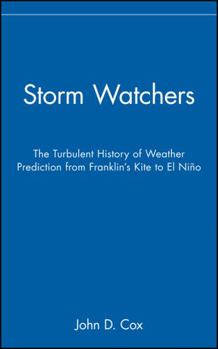Storm Watchers: The Turbulent History of Weather Prediction from Franklin's Kite to El Nino
Select Format
Select Condition 
Book Overview
A lively, inspiring account of the pioneers who sought toaccurately predict the weather Benjamin Franklin . . . James P. Espy . . . Cleveland Abbe . . .Carl-Gustaf Rossby . . . Jule G. Charney . . . just a few of theremarkable individuals who struggled against formidable odds tounderstand the atmosphere and predict the weather. Where they sawpatterns and processes, others saw randomness and tumult-and yetthey strove to make their voices heard, often saving lives in theprocess. Storm Watchers takes you on a fascinating journey through time thatcaptures the evolution of weather forecasting. From the age whenmeteorology was considered one step removed from sorcery to themodern-day wizardry of supercomputers, John Cox introduces you tothe pioneering scientists whose work fulfilled an ancient dream andmade it possible to foretell the future. He tells the little-knownstories of these weathermen, such as Ptolemy's weather predictionsbased on astrology, John Finley's breakthrough research inidentifying tornadoes, and Tor Bergeron's new techniques of weatherforecasting, which contributed to its final worldwideacceptance. Filled with extraordinary tales of bravery and sacrifice, StormWatchers will make you think twice the next time you turn on thelocal news to catch the weather report.
Format:Hardcover
Language:English
ISBN:047138108X
ISBN13:9780471381082
Release Date:August 2002
Publisher:Wiley
Length:256 Pages
Weight:1.16 lbs.
Dimensions:0.9" x 6.1" x 9.7"
Customer Reviews
3 ratings
Fascinating history and a veiled warning to us
Published by Thriftbooks.com User , 16 years ago
Anyone who watched the incredible computer-generated graphics of Hurricane Ike nearing the coast of Texas this month might find this book quite fascinating. It traces the history of weather prediction and the development of the science of meteorology over the past 200 years and an interesting story it is, replete with colorful individual geniuses who pushed the frontiers of knowledge forward -- and dumb bureaucrats and politicians who tried to block them at every turn. The book begins with Benjamin Franklin who was the first to notice that the winds in a storm moving northwards might actually be blowing in a southerly direction. But most of the other men profiled in this book who made the most striking contributions to meteoroloy -- Americans, Britons and most noticeably Norwegians and Swedes -- I had never heard of. There was the chemist Luke Howard who classified the different kinds of clouds and gave them the names we know today -- cumulus, stratus, nimbus. William Redfield was not a trained scientist but in 1821 the New Yorker was the first to describe the circular motion of winds in a hurricane. Twenty years later, Elias Loomis, a professor of mathematics and philosophy, was the first to produce a weather map. But for much of the 19th century, weather forecasting faced tremendous opposition from those who said it was contrary to God's will as well as producers of popular almanacs who faced the loss of their business. Robert FitzRoy, who captained the Royal Navy ship The Beagle which took Charles Darwin on his historic voyage to the Galapagos, coined the word "forecasting." But progress in the United States ground to a halt after the Civil War when weather prediction was placed under the control of the Army. Things grew even worse at the end of the 19th century when political appointees hostile to science took over in the administration of Grover Cleveland. The comparison to today's debate over global warming and the Bush administration's refusal for so many years to admit the problem, much less grapple with it, are too obvious to be ignored, though the author of this book does not belabor them. The consequences of blindly ignoring science were graphically and tragically demonstrated in the great hurricane that destroyed Galveston in 1900. Isaac Cline was in charge of weather forecasts in the city, though he was not a leading scientist. He baldly stated, based on no reliable data, there was no chance of a hurricane striking Galveston. He encouraged the city fathers to demolish the sea wall protecting the city. The government also took the distastrous step of denying weather watchers in Cuba access to the telegraph system because "hurricane warnings unnecessarily riled the natives." After the disaster in which he lost his own wife, Cline launched a coverup, falsely stating that he had posted hurricane warnings -- and emerged a hero. There are many fascinating stories in this book which is a stark warning of what happ
Storm Watchers - Great Historical Information
Published by Thriftbooks.com User , 21 years ago
For a meteorologist, this is clearly a must read if you're at all interested in knowing more about some of the most influential people in our field. The author obviously has done considerable homework and made some of the pioneers in this field come alive, instead of just being names and old b & w photographs. Since the book is unprecedented and I didn't know many of these people personally, it's not possible for me to say how accurate these word descriptions are, but they have the "ring of truth" to me. Some very interesting parallels can be drawn from the past to the present with the information in this terrific book!
Storm Watchers
Published by Thriftbooks.com User , 22 years ago
John Cox is, and has always been, a phenomenal reporter and writer. This book deserves to be widely read. As a work of history, it is very much welcome -- a book that sheds light on the past of a subject which is, too often, shrouded in myth. -- Keay Davidson, Science Writer, San Francisco Chronicle






